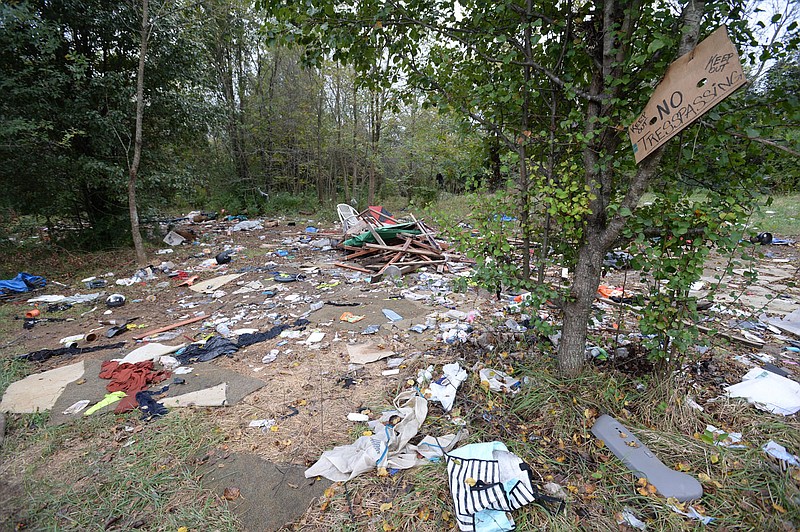FAYETTEVILLE -- The city spent $34,000 to clean up a sanctioned camp that provided refuge to unsheltered residents during the covid-19 pandemic, an advisory panel learned Monday.
The city's Environmental Action Committee, a resident panel that advises the City Council on environmental issues, heard about the challenges and successes of Safe Camp, a city-sanctioned camp that was open from August 2020 to October of last year. The camp was located on 13 acres of city-owned land west of Curtis Avenue between Huntsville Road and 15th Street. An $85,470 grant from the federal Coronavirus Aid, Relief and Economic Securities Act paid for the camp's operation. The money was administered through the city's Community Resources Division.
The committee had recently discussed environmental concerns stemming from litter and waste left by unsheltered residents near trails and waterways. Mike Williams, chief executive officer of 7 Hills Homeless Center, said the Safe Camp model served as a response to an emergency situation. Litter and waste near trails and waterways is a separate issue that reopening the camp would not solve, he said.
"It'd be more like a Band-Aid on a wound that's just continuing to bleed," Williams said. "We've got to find a way to cut the spigot off there, and that's going to require a much more robust solution than what Safe Camp provided during the pandemic."
Mental health issues and drug and alcohol use more often than not serve as root causes of homelessness, Williams said. Any potential future sanctioned camps would need programs to address those issues, along with full-time staffing, security and supportive services to have any impact, he said.
A yearlong effort like that would probably cost about $1 million, Williams said.
"But, again, we've got to figure out a way to transition from having to camp to having a home," he said.
Yolanda Fields, the city's community resources director, said the administration is working on forming a task force to tackle such issues. The goal will be to create a model to work through the challenges of homelessness and associated issues, she said.
"It just affects many people in many, many different ways," Fields said. "So we felt like the need is a community need to find solutions through community collaboration."
Debris from Safe Camp has since been cleared. Photos Fields shared showed debris started to pile up toward the end of the program. Maximum capacity at the camp was 50 people at a time. The money the city used to clean up the site was separate from the federal grant money.
Council member Teresa Turk, a member of the committee, asked for a report on the successes and challenges of the camp. She said having such a document could help the city with shaping a proposal to address homelessness in the annual budget or to pursue grant opportunities.
Margaret Britain, a resident committee member, said the committee's interest on the topic of homelessness is narrow, but members should stay updated and provide input.
"When you start to think about mental health issues and everything else involved with unhoused people, the part we're most concerned about -- protecting the environment -- is one little sliver of it," she said.
More News
NoneHomelessness in Northwest Arkansas
There were 157 people experiencing homelessness in Washington, Benton, Madison and Carroll counties, according to the Northwest Arkansas Continuum of Care’s count held Jan. 28, 2021. However, unsheltered people were not counted because of covid-19 restrictions, according to the organization’s website.
There were 369 unsheltered and temporarily sheltered people counted in the four counties in January 2020. In January 2019, it was 529.
Source: nwacoc.com
